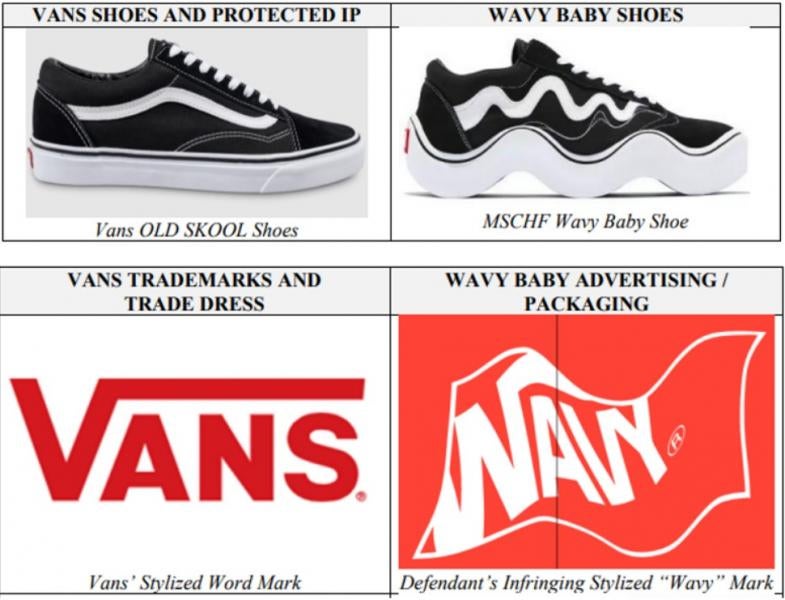Brooklyn art collective MSCHF is up to their usual mischief. After the furor over their Satan Shoes and the resulting suit and settlement with Nike, MSCHF launched a separate sneaker website, app, and line of “drops” separate from their other projects like the “Cease & Desist Grand Prix” from earlier this year. Their latest sneaker is the “Wavy Baby,” a distinctly impractical shoe with an undulating sole, in collaboration with rapper Tyga. Other than its waviness, the Wavy Baby resembles the Old Skool sneaker sold by Vans. MSCHF’s collaborator even posted a video to TikTok suggesting that Old Skool sneakers could be transformed in Wavy Babys by a microwave.
Unsurprisingly, Vans brought a trademark infringement action in the Eastern District of New York, Vans, Inc. v. MSCHF Product Studio, Inc., Index No. 1:22-cv-02156-WFK-RML. Vans’ complaint can be summed up in two images comparing the trade dress of the shoes and the Wavy Baby and Vans labels applied to each:

Unlike with Nike’s Satan Shoes suit, which MSCHF quickly settled, MSCHF seems to be girding up for a fight this time. In support of MSCHF’s opposition to Vans’ motion for a temporary restraining order blocking the sale of the Wavy Baby sneaker and fulfillment of any orders, the founder of MSCHF filed a declaration full-throatedly defending MSCHF’s stunts, including the Wavy Baby, as art and critical commentary on consumer and collector culture. Wavy Baby sneakers, in particular, “challenged the sneakerhead culture Vans participates in, questioned consumerism, and confronted the tension between a virtual and digital world.” He describes the message of the Wavy Baby sneakers as “critical discourse, questioning how such an iconic, functional brand has fallen prey to mass consumerism.” MSCHF’s argument is that the shoes are clearly parody, firmly protected by the first amendment under the decisions of Rogers v. Grimaldi, 875 F.2d 994 (2d Cir. 1989) and Campbell v. Acuff-Rose Music, Inc., 510 U.S. 569 (1994).
While parodies are protected, it’s important to remember that not every reference to an existing mark is a parody – a parody must comment on the mark to make it clear that it does not originate from the mark owner. Further, a use that comments on society at large or social trends in general is satire and needs to justify its use of the mark beyond just the humor of doing so. (“Parody needs to mimic an original to make its point, and so has some claim to use the creation of its victim’s (or collective victims’) imagination, whereas satire can stand on its own two feet and so requires justification for the very act of borrowing.” Campbell 510 U.S. at 580-581). Both mark owners and artists (or aspiring parodists) must keep the boundaries between parody (which comments on the mark owner) and satire (which does not) in mind and, if there’s any doubt whether a use of mark is infringing or protected parody, it’s best to consult with an experienced Intellectual Property attorney.




 />i
/>i

